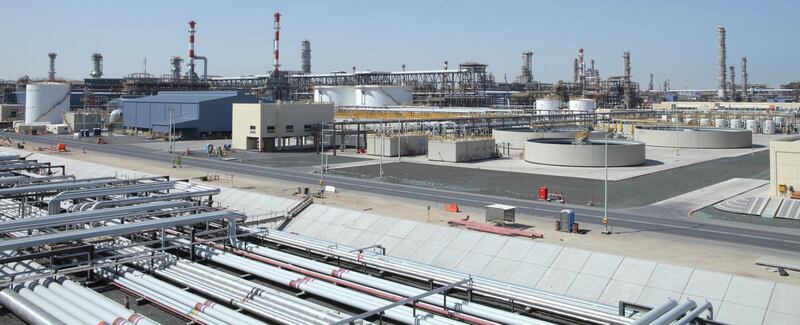Abu Dhabi National Oil Company will invest $3.1 billion on upgrading its Ruwais refinery that will provide flexibility to process crudes other than Murban, and free more of it up for export, while helping generate greater value from each barrel of oil pumped in the emirate.
“Enabling the Ruwais Refinery-West to process Upper Zakum, or similar, medium sour crude, in place of Murban light sweet crude, will allow us to extract greater value from our crude resources,” said Abdulaziz Alhajri, director of Adnoc's downstream directorate. “It will mean we can maximise the benefit of price differentials to enhance refinery margins, improve the middle distillate products and release valuable Murban crude into the market.”
The Crude Flexibility Project (CFP), due for completion by the end of 2022, will allow Ruwais to process crudes that include Upper Zakum or other types at the refinery’s 420,000 barrel-a-day west complex. Murban is a light sweet crude that fetches a higher price in export markets because it contains less sulphur and is not as dense as medium sour crudes. Ruwais refinery, Adnoc’s largest, has the capacity to process 800,000 bpd.
Adnoc is consolidating its units, streamling its operations and embarking on selling stakes in its subsidaries, including last year’s initial public offering of its fuel retailer Adnoc Distribution, as part of a new strategy aimed at extracting better value from its various businesses.
________________
Read more:
[ Adnoc, Dusup in 15-year gas sales agreement ]
[ Adnoc seeks closer ties with Japan amid downstream expansion ]
________________
The state-run energy company awarded the engineering, procurement and construction contract for the CFP project to a joint venture between South Korea’s Samsung Engineering and Netherland’s CB&I. The company didn’t disclose the value of the contract.
The project entails adding an Atmospheric Residue De-Sulphurisation unit to enable the refinery to process the Upper Zakum, or other similar crudes, Adnoc said.
“The ARDS technology is extensively used in upgrading medium to heavy petroleum oils and residues to more valuable clean environmentally friendly transportation fuels and to partially convert the residues to produce low-sulfur fuel oil and hydrotreated feedstocks,” the company said.
Adnoc's refinery upgrade is in line with global trends to reduce costs and extract higher value from processing crudes, said Spencer Welch, director for oil markets and downstream at London-based IHS Markit.
"The purchase cost of crude is the biggest cost in running an oil refinery, [and] having greater flexibility in crude purchasing is very important because it strengthens the purchasing/trading position of the refinery and potentially significantly reduces costs," he said.
"Globally refiners are constantly assessing investment and improvements, to increase the ability to upgrade crude to lighter products, reduce costs and increase purchasing options."
The UAE, the Arabian Gulf's second-largest oil producer behind Saudi Arabia, in November announced a spending commitment of Dh400 billion over the next five years and plans to invest more than 40 per cent of the total to diversify and grow its downstream businesses as part of a strategy to triple petrochemical production by 2025.
It is also building the largest integrated refining and petrochemical site in the world, at Ruwais, aimed at converting 20 per cent of Adnoc’s crude to chemicals.
The company is also on track to expand crude capacity to 3.5 million barrels per day to support future demand, particularly in Asia.
"There are several advantages to the refinery being able to process a variety of crude grades," said Richard Mallinson, analyst at consultancy Energy Aspects. "Murban prices at a premium to heavier UAE grades such as Upper Zakum, so Adnoc will usually generate more revenue from exporting Murban. The refinery can also use the flexibility to process the feedstocks that offer the best economics at any given time."






